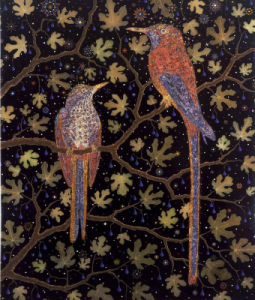Words on the Word
27. Sunday C
Habakkuk 1:2-3, 2:2-4: The righteous will live by faith.
2 Timothy 1:6-8, 13-14: God’s gift was the Spirit of power, and love, and self-control.
Luke 17:5-10: Increase our faith.
‘The righteous will live by faith’, we read in the prophet Habakkuk, who lived in the 7th century BC. For us, though, the statement resonates with jousting matches about theology fought in Europe 2100 years later. Luther’s great slogan was sola fide. Believers were to live by faith alone. He was motivated by a desire to free Christians from the notion that they had to sweat their way to heaven under their own steam, as if beatitude were a function of human effort. Whether anyone at the time of Luther or earlier actually thought this was Christian doctrine is, I’d say, doubtful. Such an attitude would in any case have been condemned by the Church as heretical. 
The idea of salvation by faith alone was perceived as a source of inner liberation, at first. It is founded, of course, on passages in Scripture which the Reformers diligently cited. We are all conscious of our lives’ lacks and failures. We know we do not live up to the standard the Gospel puts before us. It is good, then—and right—, to place trust in an almighty grace that raises up up when we entrust ourselves to ut.
As a foundation of religious life, however, the principle of sola fide places a crushing burden on individuals. All at once, everything depends on me, my spirituality, my relationship with God, my faith. And what if I find that I cannot experience faith? What if, for one reason or another, I sit in darkness and in the shadow of death? There is a risk that the whole scheme is put on its head; that faith in fact appears as the ultimate work, the endeavour I must make to be called a Christian, to have hope. In such circumstances one can easily feel terribly alone.
What, in fact, is ‘faith’? Can it be provoked? What is at stake when the apostles say to the Lord, ‘Increase our faith’? The apostles’ question is one thing. The Lord’s response is another. Often his answers are geared to show that we ask wrongly. Let us listen attentively to what God’s word, through the Church, is telling us about faith this Sunday.
The prophecy of Habakkuk begins with a lament: ‘How long, O Lord, am I to cry for help and you will not listen?’ The prophet does not live in the sweet embrace of continuous communion with God. No, he has the impression that God has abandoned his people: ‘Outrage and violence, this is all I see, all is contention, and discord flourishes.’ We can easily share this sense, when we look around at the world as it is still, today. What has become of the blessing God promised Israel’s sons, that would pour like oil, descend like the dew of Hermon upon Zion?
The Lord does not leave the prophet bereft of an answer. His answer is simple. It can be summed up in a single word: ‘Wait!’ It is a word we don’t like. We prefer to get what we want at once. God’s commandment is clear, however. At times we must accept things as they are, as imperfect and confusing. ‘Righteousness’ is then a matter of living rightly even when everything about me seems wrong. We shan’t surrender to resignation. That would be unbiblical. But we should, inspired by salvation history and the history of the Church, trust that God will intervene and save when the right time comes—and that such a time may represent, for us, a distant future. To live by faith is to live patiently. It is to see the present moment, and myself in the present moment, in a perspective that surpasses my own experience.
Paul, too, exhorts us to live with a view at once to the past and to the future. ‘I am reminding you’, he writes to Timothy, ‘to fan into a flame the gift that God gave you.’ He refers to his friend’s ordination; but these words could be directed to each of us with reference to our baptism. To live by faith is to live on divine gifts that are mine already. These gifts are bestowed sacramentally, above all, in a way that is blessedly objective. Are you passing through a crisis of faith? If so, the thing to do is to revisit the ritual of baptism and to remind yourself that you have been signed with the saving sign of the Cross and freed from sin, been made into a dwelling for the Holy Spirit, raised from death to life in the name of the holy Trinity. To live by faith is to realise potential implanted in us. How? By the way in which we shape our lives, by our concrete options, by the decision to live recognisably as Christians. We easily think that faith must somehow be mystically tangible first, and that we, afterwards, will live holy lives as a natural consequence. In fact, it tends to work the other way round. It is when we live rightly, with a view to faith, that faith is strengthened.
In the Gospel the Lord answers the Twelve’s prayer, ‘Increase our faith’, by means of an image: ‘Were your faith the size of a mustard seed, you could say to this mulberry tree, Be uprooted and planted in the sea.’ When you think of it, the image is absurd. No tree is planted in the sea. The order of creation does not admit such a thing, and the Word by which all things were made is the same Word that speaks to the apostles. To live by faith, therefore, is to live open to the possibility that what is impossible may in fact happen—that sin can be blotted out and the dead be raised. We learn this kind of openness, not by sitting in a deck chair twiddling our thumbs, but by faithfully carrying out our God-given duty. The fantastic image of the flying mulberry tree is followed by another which is wholly concrete. It is the image of the servant who, after a long day’s ploughing, goes inside, puts on his apron, makes supper, waits on his master at table gallantly, without complaint, even with joy, because that is his obligation.
If we learn to live like this, patiently, confidently, faithfully, well, then we shall be living by faith. Then we can expect the Lord to give, as today’s marvellous collect points out, even ‘what prayer does not dare to ask’. 
Who knows if the bit of land we’re ploughing right now, whatever our station in life, the land that can seem to us hopeless and too full of rocks, might not be precisely the soil the mustard seed needs to be planted and grow into a delightful tree in which the birds of the air can find rest? It is self-evident that we cannot live on these terms in isolation. We need one another, one another’s encouragement and help, in the Church’s communion, through Christ, with him and in him. This fellowship is given us. Let us never forget to thank God for it.
